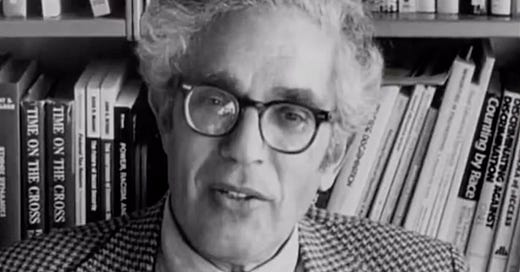
Nathan Glazer, the preeminent sociologist and a pioneering neoconservative critic of progressive social reforms, died Saturday at the age of 95. A child of Jewish immigrants from Warsaw, Glazer began his career sympathetic to socialism before becoming disillusioned with the effects of the policies he once championed. He joined other former liberals like Irving Kristol and Norman Podhoretz as one of the originators of the neoconservative movement. We've collected remembrances and homages to him here.
In 2016, Peter Skerry wrote an appreciation of Glazer, then 93, in National Affairs:
Michael Walzer has written that "politics at its best is the art of overcoming pride and every sort of individual caprice while still associating honorable men." Strictly speaking, Nathan Glazer is not a political person in this sense; he has not devoted himself to the art of association. But he is an honorable man and a good citizen whose life's work has consistently and continually demonstrated the capacity of "overcoming pride and every sort of individual caprice."
Read the whole article here.
Jason Willick's essay on Glazer's career in The Wall Street Journal from September depicts Glazer's independence and ideological iconoclasm:
City College in the 1930s and ’40s was a politically active haven for aspiring Jewish scholars, whose admission to Columbia and other Ivy League schools was restricted by quotas. This was the milieu that incubated the “New York intellectuals,” a loose cohort of left-wing, anti-Soviet writers and thinkers—including Daniel Bell, Irving Howe and Irving Kristol—who shaped American intellectual life in the mid-20th century.
Mr. Glazer, 95, is one of the last living members of this group. As young radicals often do, he drifted rightward as he grew older. After college, he decided “America would be fine if it was more like Sweden.” Then he concluded “it can’t be, it’s too diverse.” Now he has doubts about social democracy altogether: “It runs into its own problems.” A collection of Glazer's essays, including from The Public Interest, which he co-edited for many years, can be found at the National Affairs website here.
For an excellent example of Glazer's thinking and writing, read his essay American Values & American Foreign Policy from 1976 in Commentary.
The United States is probably the only major country in the world in which it is taken quite as a matter of course that people will talk seriously about the relation of the nation’s values to its foreign policy. We in this country seem to believe, first, that there is something distinctive about our values, such that we can speak—even if with some uncertainty—about American values; and, second, that these values do, or should, affect our foreign policy. We do not drag out the theme of American values in their relation to foreign policy only because we happen to be celebrating our bicentennial and feel therefore that some special Sunday topic, some ceremonial theme, is necessary. We are used to talking about American values in many contexts besides foreign affairs—our domestic social policies, our racial policies, the urban crisis, the state of religion, or of the youth, or of the family. For Americans, such considerations are not a Sunday special—they are ordinary everyday fare.
Even though the United States is closer to its semiquincentennial than its bicentennial, Glazer's trenchant commentary has lost none of its value.
In 2017, The Chronicle of Higher Education published an interview of Glazer by John Kaag. The last question is perhaps the most illuminating about the breadth of his curiosity and the flexibility of his intelligence -- all without arrogance or complacency:
When you think about your career, what are you most proud of?
Maybe I should leave this out, but I’ve been thinking of my past and not thinking about it as large and significant. I had some fortunate accidents, which gave me a prominence I probably don’t deserve. I worked on a book that became The Lonely Crowd, and it became the biggest best seller in American sociology. I was supposed to write the great book on American ethnicity, and eventually, I didn’t. I’d collect essays and think about it, but then I thought there were enough good people saying good things about the issue. Sometimes I think that I wasn’t self-directed enough, that I got diverted into too many different topics.
Of course American Judaism — that was really my first book. And it became a kind of semi-classic in this little field, so that commits you in a way to go to conferences and so on. And then there is the second edition, the third edition, and eventually you lose touch since so much keeps happening. Like I said, I got diverted.
I was interested in architecture always. And when I came to Harvard I was into art. I had a connection to the architecture school at Berkeley, and at Harvard they offered me a similar opportunity.
My interests were diverse, and I’m pleased that despite how diverse they were I was able to achieve a reputation in sociology. I certainly don’t regret not having made a fuller commitment to the discipline, because I had these interests. What could I do? With Glazer's passing, another of a generation of critics of progressivism has nearly all gone. The entire conservative movement is indebted to them for their intellectual honesty, unquenchable curiosity, and rigor. Their shadows, Glazer's included, seem only to grow longer as the virtues they embodied seem to grow rarer.










